All 10 entries tagged Motorcycles
No other Warwick Blogs use the tag Motorcycles on entries | View entries tagged Motorcycles at Technorati | View all 2 images tagged Motorcycles
April 25, 2011
BMW R100GS Paris–Dakar refurbishment and redesign – latest progress
Some recent updates by top expert Andrew Sexton. Including:
- Oil sump extension;
- New oil cooler;
- Oil cooler relocation;
- Oil cooler thermostat.
The parts were bought from http://www.boxxerparts.de
Andrew has also professionally rewired the electrics, making a neat job out of the Acewell speedo and a replacement rear led light. It all now seems to work perfectly. Finally, he found that it had been suffering from low oil pressure, due to a missing o-ring in the oil filter assembly (a common mistake made by a non-specialist technician). The big-end bearings had signs of damage, so were replaced. Andrew also re-seated the exhaust valves. Less smoke and more MPG have resulted.
I've added an MRA Vario screen from Motorworks, adjustable to give perfectly non-turbulent air flow. There's also a Garmin Zumo sat nav to go with the Midland BT 02 bluetooth intercom.
I've ditched the metal panniers (Ted Simon's advice). They've been replaced by a pair of Ortlieb waterproof panniers (a single pannier can carry all of my camping gear), a Hein Gericke tail bad, and a small cool bag.
Some photos:



September 28, 2008
Les Eyzies et la vallée de la Vézère, Easter 2008
Dinner was taken at Café de la Mairie.
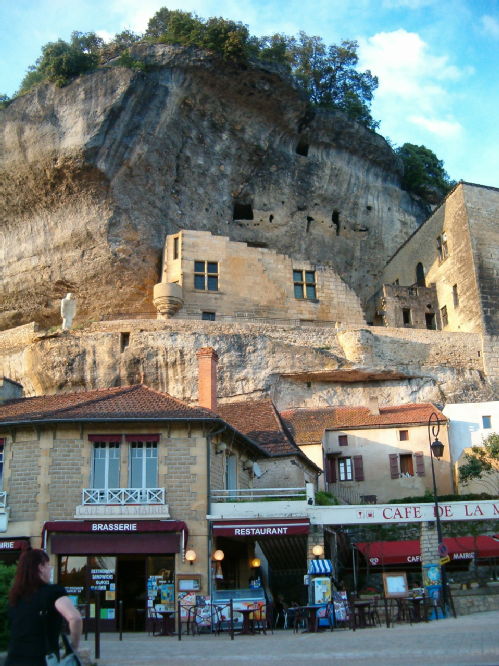
Cassoulet au canard. A worthy reward at the end of a long ride across France.
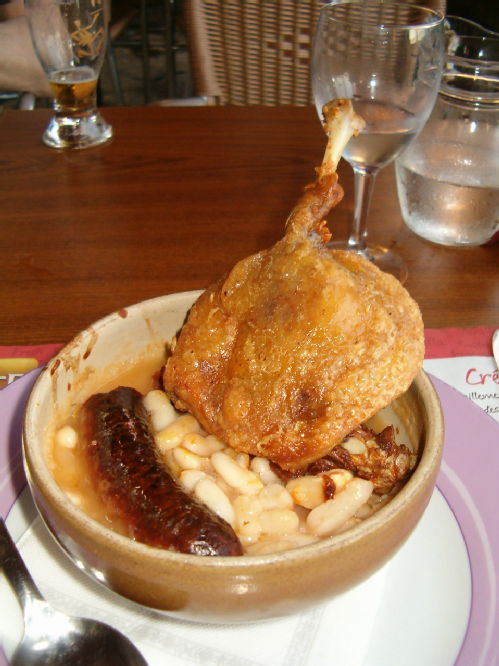
Back across this eccentric bridge…
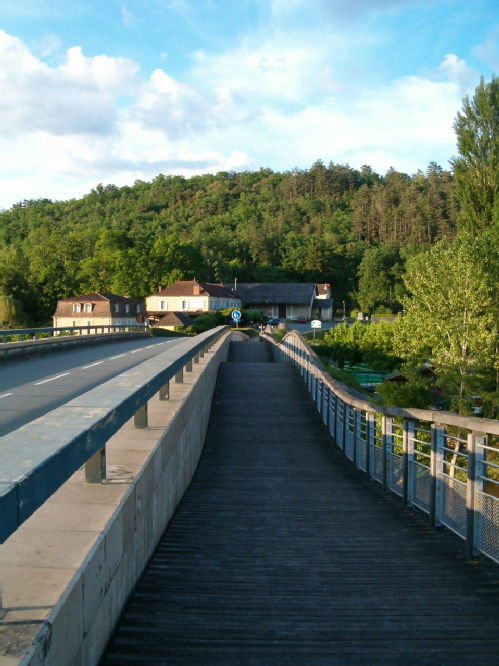
For a good night’s sleep at Camping de la Rivière.
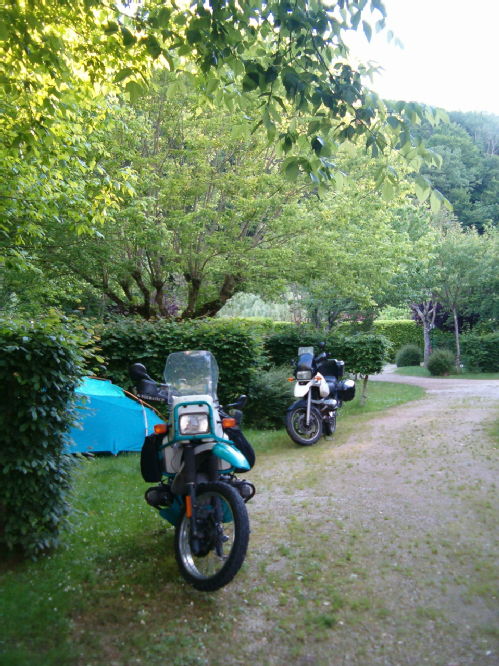
France, Easter 2008
France was empty. An over-priced currency. Inflation. Recession. A low pressure weather system drifting across from the Atlantic. Tourists absent. Saturday afternoon, petering out of a cold and wet Vacances de Pâques, giving no urgency to the light local traffic scattering along the vague peripheries of each small town and village through which we darted. Slipping past thousands of sleepy natives barely noticed, as if a pair of inconsequential swifts returning to England from their annual migration. The happy-warm South and its dusty Mediterranean air behind us.
A fast true road, occasionally lined with Napoleonic regiments of plane trees, but generally more wide open. Imperial Roman straight-line determination overlaying a sensuous rolling Gallic landscape and conquering a hundred miles in a flash: this road, through the Indre Department and up to the Loire, has a dreamlike character. The sensation was the same the first time that the old airhead and I traversed it, riding south to Barcelona in 2001: across the desertified Loire at chateau-grand Samur, launching on to the widely furrowed land. And each time since, its somniferous character has been amplified with a creeping sense of déjà vu. A sense illuminated by the unusual array of brightly painted water towers that dot and dash the landscape signalling to each other across an expanse of farm land, each one firing off a distinct point in my memory, and collectively building up to the tipping point of realisation: a familiar route revisited.
The means by which we select our roads is the same as that used to navigate the unfamiliar dishes listed upon the menus of the relais at which we would periodically stop. Random. Martin’s so-called ‘GPS’ being an in-joke: a tiny plastic clipboard bolted to the handlebar brace of his 1994 BMW R1100GS overlander, carrying small sheets of note-scrawled paper. Martin, professionally, is a microscopist. Miniaturised instructions, his notes work as a minimal roadbook. Complimenting his notes, I carry each relevant page of a dismembered road atlas, folded into the plastic window of a bag strapped across the long-range tank of my rusty trusty old R100GS Paris-Dakar – being an amateur geographer, I have the bigger picture in mind. There is madness in this method, or at least enough eccentricity to keep things interesting. With no particular agreement at any time, either the map or the road book takes the lead. At too in-frequent intervals the pair are brought together on some precarious edge of the road meeting place, and there they form the basic articles for debate and eventual agreement.
Contrary to popular misapprehension, the motorcycle is as much a machine for stopping and comprehending as it is for accelerating and escaping. Even the relatively wide GS, with its sideways protruding flat-twin cylinders may always find some small strip of tarmac, gravel or even dirt on which to perch for a contemplative pause. When confronted by two fat GS’s sat alongside each other, the friendly and tolerant drivers of rural France always give us room. Similarly, when confronted by two motorcyclists (one fat, one thin) sat opposite each other at a restaurant table, the reputedly intolerant waiters of rural France are pleasingly patient. Slow bikes, slow food.
Salade aux noix, andouillette grillée, fromage de chévre bleu s’il vous plaît.
I communicated through imprecisely accented French. The waiter-chef responded with acutely accented eyebrows. There being only two options on the menu, it was either an adventure in offal or cote de porc predictability. Martin chose the latter. Irresistibly, I went for the wildcard. Through the following five minute interlude and the fresh salad starter, occasional glances were exchanged. The waiter-chef would flit between a small kitchen for the preparation of accompaniments and a vast open fireplace upon which the meat slowly cooked. I could read his thoughts: “does the Englishman realise what he is about to eat?”. But could he read mine in return? – “does the Frenchman realise that I really do understand the extraordinarily pungent source of andouillette?”. Starters completed, and the smell of pork began to fill the banquet-sized hall in which we sat. One could easily imagine a small army of musketeers stopping by for a long lunch, perhaps interrupted by a duel, if not a rafter-swinging sword fight defending the honour of France. Serving wenches would not have been out of place, but in this age, they are sadly absent.
When it arrived, it was indeed deliciously medieval.
The waiter-chef lowered the large plate down swiftly, and swept away with efficiency. Striding off into the kitchen, he paused to attend to misaligned cutlery on one of the many un-occupied tables – merely perhaps to enable a check upon my reaction.
I think very highly of the late Capetonian comic actor Sid James. It was undoubtedly a Sid James moment.
I sliced with painful precision through the outer skin, revealing a mess of squiggly chopped-up pig internals and externals.
Andouillette smells and tastes exactly as it appears.
Martin, clearly, was disgusted.
The waiter-chef was perhaps a little bit impressed.
And my verdict?
Very good.
Not necessarily suited to everyday luncheon. But still, very good.
Can I convince you to try this magnificent cut? Perhaps for environmental reasons (eat offal, save the planet)?
Go on, you will not be disappointed.

November 20, 2007
One Man Caravan by Robert Edison Fulton Jr. – review
- Title:
- Rating:

To mankind’s age old comment on the journey of life that “the first hundred years are the hardest,” the traveler on a motorcycle could add that the first thousand miles are equally tough. p.12
And what of those first thousands miles, down the Dover road and across a depressed Europe, June 1932? Tedium and the uncomfortable wearing together of metal, rubber, muscle and bones that motorcycle manufacturers term “the running-in period”. Robert Edison Fulton Jnr. was perhaps the first of many to take the hard way round: eastwards across Europe, the Middle East, Asia and the USA. Ted Simon recommended this book to me. Bernd Tesch provides the foreward to this recent edition. They both know what it’s like to sit high over a rumbling air-cooled boxer engine for immense distances. Ted and Bernd ride BMW GSs, like mine. As travelers and writers, we are all descended from Bob Fulton, just as the DNA of his boxer engined Douglas bike is present even today in the latest high powered BMW bikes (some authorities claim that BMW copied the Douglas engine for its early bikes, mounting it transversally rather than longitudinally).
Every long journey by motorcycle has its “running-in period”, whether aboard a new machine or revisiting an old companion. But it doesn’t stop there. Beyond that first 1000, there is a slow oscillation around the point at which all runs smoothly. On a bike their is a much tighter and much more critical feedback loop between the environment, the mind and body of the rider, and the machine; all in fine balance, or working their way out of equilibrium:
As the day wore on the sound became more alarming. When I started that morning, the steady drone of the exhaust had been deep and chesty. But now, after half-a-dozen hours of desert driving, it seemed to fill with static, the machine began to wobble, the tires seemed flat, the whole engine seemed on the verge of falling apart, collapsing.
It wasn’t the machine, it was nerves; strung tight, pulled tighter by the constant thought of “what would happen if something happened?” p.65
Ride a motorcycle if you want to know and master paranoia; get a grip upon the awful power of the human mind to envisage even unlikely disasters, and to be pulled head first towards them. Psychologists now call this “target fixation”. If you look at the kerb you will hit it. That’s lesson 1 on day 1 of any riding course.
Bob Fulton’s journey is about transforming that negative target fixation into something positive: how to fall into the right kind of trouble; how to make something out of almost nothing, even amongst the emptiness and desolation of receding empires and expanding deserts. It is quite an amazing story. In many ways such a journey was easier then. America hadn’t given its people an often undeserved bad name. Imperial outposts provided staging points and frontiers linking every hiding place. Even beyond the beat of the colonial bobbies, their influence reached far: his ride into tribal Afghanistan would make a modern traveller deeply jealous. Then it was treacherous, coming at the tale-end of a serious disruption of the internal balance of terrors. Islamic hospitality was his saviour, along with enlightened rulers and friendly peasants. Now, especially for an American, it would be impossible. One is reminded of Chevy Chase hanging upside down from a wooden post: “hi, we’re Americans” – big mistake, one of many.
And after the Middle East and Central Asia, on to “French” Indo-China as it was then, before the first great US foreign policy disaster extinguished that world of relative innocence. He had assumed the service station owner at Angkor, Cambodia, was trying to rip him off. In fact it was the other way round: he was trying to give money to the brave motorcyclist! Bob Fulton realised, as many others have since, that the world is on the whole friendly and helpful, on a personal level. It’s on a more international global level that nightmares erupt. Japan for example, which in 1933 was deeply in love with all things American. If the Kobe Motorcycle Club had achieved the political power that they so clearly deserved, WWII might have been settled on the race track, aboard Indians and Harleys. And Bob Fulton might have been there cheering his new friends on. At a personal level, amongst the small band of Japanese riders with whom he crossed the islands, there could only ever be great respect.
One Man Caravan: a great adventure. Well written, with a scattering of fascinating pictures and maps. Honest. Full of excitement and exoticism, but with many connections between that world (now disappeared) and the present day.May 02, 2007
Dreaming of Jupiter by Ted Simon
Writing about web page http://www.jupitalia.com
- Title:
- Rating:

59,000 miles on a motorcycle is, in experiental terms, quite a journey. It is many times greater than that same distance travelled by car. And by air? – there is no comparison possible. There is always something special about travelling by motorcycle. Ted Simon has developed conclusive arguments on the subject: being exposed to the elements and the terrain, covering large distances with ease, experiencing sudden contrasts and juxtapositions, meeting people on their own more human terms, the constant physical and mental difficulty that intensifies experience, the ability to just stop anywhere at anytime, changing direction or just letting unplanned things happen, and quite often the humility of being a small individual on a big road. Speed and agility should of course also be mentioned. And danger? Yes, as Ted recently explained to me, that has to be part of it too. You’ll find all of these factors throughout Ted’s latest book, Dreaming of Jupiter. Both on the journey that it documents, and in the resulting book, they combine to make for an exciting and important read.
In 29 months, between January 2001 and June 2003, Ted piloted his bike, with varying degrees of skill and luck, on a journey of just that great intensive and extensive length. For a second time, he encircled the world and joined up countless distinct points and narratives just as he had in the ‘70s, resulting in the classic Jupiter’s Travels . On many occasions, chance and geopolitical forces conspired to pull him away from his planned route, which should have followed that of the 1973 journey. Afghanistan was out of the question, with consequences for Pakistan. The results are, however, still as interesting, and perhaps even more significant in providing us with a picture of how the world has changed in 30 years, and to where it might be heading. Perhaps the most important thread joining the two books together is that of migration, and the plight of the migrant. In 1973, I have claimed (and Ted says I’m on the right track) he was a migrant amongst migrants. Now he returns to the ever moving ever striving ever changing “unfinished world” (Ted’s great alternative description of the developing world). The intensity of it’s desires and frustrations is shocking. This book acts as a warning to the rich nations.
So there then are a few good reasons to read Dreaming of Jupiter. But there’s a lot more. Ted’s style, a master of the art of travel writing, sets these arguments within a thoroughly enjoyable context. There’s more humour than the first book. Characters and situations are drawn up rapidly, but without resorting to cliches and stereotypes. Add to that lots of action (including one of the most dangerous high altitude breakdown rescues ever), beautiful ladies, fun with the Allende’s, and a BMW R80GS, what more could you possibly ask for?
February 11, 2007
The Road – motorcycle riding and writing by T.E. Lawrence
The Mint is an extraordinary but often overlooked book. Deliberately rough and forthright, it gives an account of the time spent by T.E. Lawrence as an ordinary cadet and airman in the RAF (hiding under the alias T.E. Ross). There is little joy or freedom in the book. The author seeks out the supression of self that is service, so as to demonstrate, amongst other things, the near moral bankruptcy of the British military post-WWI. However, amidst the depression and squalor, towards the end of the memoirs (and once posted to the much more salubrious Cranwell College), the following chapter stands out.
Lawrence had by this time (1925-26) become an aircraft engineer with experience and knowledge. He found something in this work that even surpassed his time amongst the leadership of the Arab Revolt. Fast machines and freedom. And most of all, motorcycles. This generated perhaps one of the best accounts written of a motorcycle journey. We are given the impression that this exhilerating ride is nothing but an everyday occurence. And no doubt with the fresh tarmac and empty roads of the mid-Thirties, it was just that. These days one rarely has a chance to experience the road in this way, and certainly not to duel with a Bristol Fighter above. Motorcyle safety has also improved somewhat. Lawrence’s Brough Superior, perhaps the 30’s equivalent of a modern Suzuki Hayabusa hyper-sports tourer, had almost no brakes, almost no suspension, and a hand gear change making engine braking a terrifying prospect. And yet it gave 52bhp – almost as much as my R100GS. The rider wore no helmet and no goggles. And certainly no kevlar body armour. And he still pushed it so hard that the bike lunged into a near fatal tank slapper.
Ten years later a similar event led to his death.
One of the greatest accounts of a motorcycle ride…
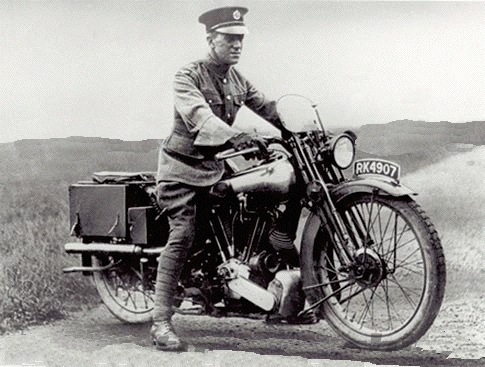
The Road
The extravagance in which my surplus emotion expressed itself lay on the road. So long as roads were tarred blue and straight; not hedged; and empty and dry, so long I was rich.
Nightly I’d run up from the hangar, upon the last stroke of work, spurring my tired feet to be nimble. The very movement refreshed them, after the day-long restraint of service. In five minutes my bed would be down, ready for the night: in four more I was in breeches and puttees, pulling on my gauntlets as I walked over to my bike, which lived in a garage-hut, opposite. Its tyres never wanted air, its engine had a habit of starting at second kick: a good habit, for only by frantic plunges upon the starting pedal could my puny weight force the engine over the seven atmospheres of its compression.
Boanerges’ first glad roar at being alive again nightly jarred the huts of Cadet College into life. ‘There he goes, the noisy bugger,’ someone would say enviously in every flight. It is part of an airman’s profession to be knowing with engines: and a thoroughbred engine is our undying satisfaction. The camp wore the virtue of my Brough like a flower in its cap. Tonight Tug and Dusty came to the step of our hut to see me off. ‘Running down to Smoke, perhaps?’ jeered Dusty; hitting at my regular game of London and back for tea on fine Wednesday afternoons.
Boa is a top-gear machine, as sweet in that as most single-cylinders in middle. I chug lordlily past the guard-room and through the speed limit at no more than sixteen. Round the bend, past the farm, and the way straightens. Now for it. The engine’s final development is fifty-two horse-power. A miracle that all this docile strength waits behind one tiny lever for the pleasure of my hand.
Another bend: and I have the honour of one of England’ straightest and fastest roads. The burble of my exhaust unwound like a long cord behind me. Soon my speed snapped it, and I heard only the cry of the wind which my battering head split and fended aside. The cry rose with my speed to a shriek: while the air’s coldness streamed like two jets of iced water into my dissolving eyes. I screwed them to slits, and focused my sight two hundred yards ahead of me on the empty mosaic of the tar’s gravelled undulations.
Like arrows the tiny flies pricked my cheeks: and sometimes a heavier body, some house-fly or beetle, would crash into face or lips like a spent bullet. A glance at the speedometer: seventy-eight. Boanerges is warming up. I pull the throttle right open, on the top of the slope, and we swoop flying across the dip, and up-down up-down the switchback beyond: the weighty machine launching itself like a projectile with a whirr of wheels into the air at the take-off of each rise, to land lurchingly with such a snatch of the driving chain as jerks my spine like a rictus.
Once we so fled across the evening light, with the yellow sun on my left, when a huge shadow roared just overhead. A Bristol Fighter, from Whitewash Villas, our neighbour aerodrome, was banking sharply round. I checked speed an instant to wave: and the slip-stream of my impetus snapped my arm and elbow astern, like a raised flail. The pilot pointed down the road towards Lincoln. I sat hard in the saddle, folded back my ears and went away after him, like a dog after a hare. Quickly we drew abreast, as the impulse of his dive to my level exhausted itself.
The next mile of road was rough. I braced my feet into the rests, thrust with my arms, and clenched my knees on the tank till its rubber grips goggled under my thighs. Over the first pot-hole Boanerges screamed in surprise, its mud-guard bottoming with a yawp upon the tyre. Through the plunges of the next ten seconds I clung on, wedging my gloved hand in the throttle lever so that no bump should close it and spoil our speed. Then the bicycle wrenched sideways into three long ruts: it swayed dizzily, wagging its tail for thirty awful yards. Out came the clutch, the engine raced freely: Boa checked and straightened his head with a shake, as a Brough should.
The bad ground was passed and on the new road our flight became birdlike. My head was blown out with air so that my ears had failed and we seemed to whirl soundlessly between the sun-gilt stubble fields. I dared, on a rise, to slow imperceptibly and glance sideways into the sky. There the Bif was, two hundred yards and more back. Play with the fellow? Why not? I slowed to ninety: signalled with my hand for him to overtake. Slowed ten more: sat up. Over he rattled. His passenger, a helmeted and goggled grin, hung out of the cock-pit to pass me the ‘Up yer’ Raf randy greeting.
They were hoping I was a flash in the pan, giving them best. Open went my throttle again. Boa crept level, fifty feet below: held them: sailed ahead into the clean and lonely country. An approaching car pulled nearly into its ditch at the sight of our race. The Bif was zooming among the trees and telegraph poles, with my scurrying spot only eighty yards ahead. I gained though, gained steadily: was perhaps five miles an hour the faster. Down went my left hand to give the engine two extra dollops of oil, for fear that something was running hot: but an overhead Jap twin, super-tuned like this one, would carry on to the moon and back, unfaltering.
We drew near the settlement. A long mile before the first houses I closed down and coasted to the cross-roads by the hospital. Bif caught up, banked, climbed and turned for home, waving to me as long as he was in sight. Fourteen miles from camp, we are, here: and fifteen minutes since I left Tug and Dusty at the hut door.
I let in the clutch again, and eased Boanerges down the hill along the tram-lines through the dirty streets and up-hill to the aloof cathedral, where it stood in frigid perfection above the cowering close. No message of mercy in Lincoln. Our God is a jealous God: and man’s very best offering will fall disdainfully short of worthiness, in the sight of Saint Hugh and his angels.
Remigius, earthy old Remigius, looks with more charity on and Boanerges. I stabled the steel magnificence of strength and speed at his west door and went in: to find the organist practising something slow and rhythmical, like a multiplication table in notes on the organ. The fretted, unsatisfying and unsatisfied lace-work of choir screen and spandrels drank in the main sound. Its surplus spilled thoughtfully into my ears.
By then my belly had forgotten its lunch, my eyes smarted and streamed. Out again, to sluice my head under the White Hart’s yard-pump. A cup of real chocolate and a muffin at the teashop: and Boa and I took the Newark road for the last hour of daylight. He ambles at forty-five and when roaring his utmost, surpasses the hundred. A skittish motor-bike with a touch of blood in it is better than all the riding animals on earth, because of its logical extension of our faculties, and the hint, the provocation, to excess conferred by its honeyed untiring smoothness. Because Boa loves me, he gives me five more miles of speed than a stranger would get from him.
At Nottingham I added sausages from my wholesaler to the bacon which I’d bought at Lincoln: bacon so nicely sliced that each rasher meant a penny. The solid pannier-bags behind the saddle took all this and at my next stop a (farm) took also a felt-hammocked box of fifteen eggs. Home by Sleaford, our squalid, purse-proud, local village. Its butcher had six penn’orth of dripping ready for me. For months have I been making my evening round a marketing, twice a week, riding a hundred miles for the joy of it and picking up the best food cheapest, over half the country side.
The full text of The Mint can be found online.
February 04, 2007
Why travel by motorcycle?
Follow-up to Jupiter's Travels by Ted Simon – a really great book of travel or migration from Transversality - Robert O'Toole
Because things like this happen…
Arriving at a hotel in Peru, no doubt looking somewhat worn out by a hard ride across South America, Ted Simon is pleased to be given a discount:
‘Por essos que llegen en coche, ochenta. Pero essos en moto son muy hombre,’ said the clerk with a grin. In other words, car drivers pay the full rate but there is a discount for heroes. p.288
Heroes deserve discounts!
January 16, 2007
Jupiter's Travels by Ted Simon – a really great book of travel or migration
- Title:
- Rating:

A very great book, many agree on that. But what kind of book is it? For a while I thought that I could take an interest in the travel writing genre, having enjoyed and learnt greatly from Jupiter’s Travels. I read a lot of travel books. Some are impressive in their own ways. But I remained disappointed. Then recently I read Ted Simon’s classic for a fourth time. Half way through Africa, the second of the journey’s six continents, my mistake became obvious. It’s not really a travel book at all. It is a book of migration, diaspora, escape.
You can, if you want, read Jupiter’s Travels as a great adventure story, which it certainly is. It’s a good, if not the best, motorcycle travel book. If that’s what you want, then just read it. But there’s more. Much more. This is my response to the first two chapters…
Conventional travel books are essentially long postcards dispatched to home. ‘Wish you were here’. Or in some cases, ‘bet you’re glad you’re not here’. Eventually, as we know right from the outset, the writer gets back to the home that was always there. But there is never really a homecoming, or even a home in Jupiter’s Travels (the sequel to Jupiter’s Travels was at one point published as Riding Home, but is now entitled Riding High). Yes, the world was encircled in Simon’s tightening noose. The two ends of the journey, start and finish, twisted around each other on the return to Coventry. The rope tightened…but around thin air. The world had slipped away and refused to be suffocated.
A life, the journey, continued, jumping back and forth across the surface of the world, California, India, France, Romania etc. It continues even now. Part Jewish, part German, part Romanian. Human shrapnel dispersed the First World War and the collapse of the Ottoman Empire. Culturally English, living in America, perhaps even a little bit Indian (spiritually). Part this and part that: Ted Simon – like half the people in the world, on the move, looking for opportunity and experience. A migrant amongst migrants.
Why does this matter? What difference? Travel writing has a recurrent fault: the writer/traveller never really lets go. The journey remains as an interlude within the career. The people and places that are documented never rise above the status of curiosities. The events, the interruptions, are mere diversions. Reality, coincidence, only distracts from the essence of places, or rather landmarks, represented as recollections, travellers tales, postcards, ideals and ideas. But the world is actually full of migrants and coincidences who, to the travel writer, may seem incidental, never true to a place. The vast majority of people in or from the developing world are migrants. Accident, the interconnections between the unstable and shallow surface of things, is the real. Real places, real experiences, which may seem permanent and eternal to the travel writer, are in fact transitory and temporary constructions of coincidence. History (human and natural) proves this, although the power of the travel industry transforms the mistaken apprehensions of the travel writer into self-fulfilling prophecies: places become more like the stories that are told about them. The importance of Ted’s book is that he actually becomes a migrant (or perhaps always was one), and is thus able to encounter the world and its people on their own terms. Being a migrant amongst migrants allows the writer to value people, places and events. I can’t think of single location in its 447 pages that could ever become a new tourist attraction. They are all far too real and minor. Many of them no longer exist, having been swallowed up by development, decay or dessertification. An epic book of an epic journey, never serving the imperialistic colonising travel industry. The philosophers Deleuze and Guattari invented the term ‘minor literature’ to describe writing that comes from migrants and under-dogs. It may still be great literature. Kafka they say is minor literature. But it doesn’t come from the dominant major culture within which it swims. Jupiter’s Travels is part of a related genre: minor travel literature. This is how it’s done…
63,000 miles on that feeble little machine! Hacked together from the Meriden parts bin, amidst a near-death experience for the old Triumph company, and then the total collapse of Midlands industry. Only hours south from that miserable place the crankcase spewed its store of lubrication across the road. Failure in the 1970’s was just part of the plan, quality control to be undertaken by the customer out on the road. It was rebuilt and the journey stuttered into life again.
Half way across Lybia and the engine had already started to self-destruct. In those days a spare piston was just part of any long distance rider’s toolbox. The ability to strip and rebuild an engine somewhere out in the African bush? Taken for granted. And finally, just south of Louis Trichardt in SA (where by coincidence I once broke a gearbox) valves dropped, a sleeve corrugated, rings warped and the piston seized:
“The broken metal had penetrated everywhere and again I was struck by the force of the coincidence that all this havoc had been wrought virtually within sight of Johannesburg”. p.173
The end clearly being both nigh and divinely ordained, any normal person would have bailed out. But Ted Simon is no ordinary person. He still had another four continents to crash through (with increasing grace and understanding): interrogations by the Brazilian police, vast landscapes to carve out, portraits to draw of hundreds of people in detailed miniature, love and ideals, horrible accidents (when fishing not riding), India, and an encounter with destiny.
Apparently, a machine only works when it breaks down. Or as the journey demonstrated:
”...the interruptions were the journey.” p.132
And what a machine! A literary machine, an intellectual machine, a desiring and sometimes paranoiac machine. All wired into the bike, the journey and its improbable rhythms:
“The movement has a complex rhythm with many pulses beating…all this metal in motion, amazing that it can last for even a minute, yet it will have to function for thousands of hours [like a human heart]...Through all these pulses blending and beating I hear a slow and steady beat, moving up and down, three semi-tones apart, a second up, a second down…Is it the pulse of my own body intercepting the sound, modifying it with my bloodstream?” p.28-29
The rhythm is both dependable and on the edge of breakdown. Like consciousness itself. It acts as a single line through time and space against which the world is measured. Marking time both produces and absorbs intensity. And then looking outwards from this beat, time and its extension in space is conquered:
“From Tripoli to Sirte is three hundred miles, and I’m really flying with the engine singing for me and everything rapping along nicely. There’s a lot of rain, but I’m less nervous of the wet now, on tar at least. The land and sea lie flat out forever, and I can see the weather coming maybe fifty miles ahead. I have never seen so much weather. I can see where it begins and where it ends; I can see the blue sky above, and the approaching storms and then the good times beyond. Remarkable. Like having an overview of past and future. I am a world spinning through visible time.” p.53
And at the end of Africa:
“I have just ridden that motorcycle 12,245 miles from London…As I think about it I have a sudden and quite extraordinary flash, something I have never had before and am never able to recapture again. I see the whole of Africa in one single vision, as though illuminated by lightning.” p.183
He is of course that lightning flash, connecting thousands of disparate and ever moving points across the vastness of Africa. That interconnection of surfaces is then his essence, the essence of the migrant. He qoutes Gerard Manley Hopkins on the strangeness of being (he revived the medieval philosophy of Duns Scotus and its notion of coincidental but non-decomposable, un-dissolvable uniqueness and identity: essence through accident).
But how many people need to go through 63,000 miles of pain and pleasure to get a home, to clarify and solidify their own substance?
Why? What motivation? There was something demonic, possessing – not just the fire in the cylinder bores, although the bike is important in itself. Rather some circuit in Ted himself, circulating round and round iteratively, sometimes whirling like a tornado of doubt and fear sucking events into its core. At times the force is intense, a whirlwind ripping across the surface of the Earth. Is the journey there to satiate and extinguish that force entirely? Therapy? Or perhaps travel of this kind, and its writing, is a learning process: the question being how to tame and harness that power. How to live successfully as a migrant? Perhaps that could help us with our conflicts and confusions? In Tunisia the effects start to look dangerous. In Libya and Egypt, the raging Yom Kippur war perhaps distracts the police and the people from the effect. And then in Egypt it comes back even more fiercely:
“Could turbulence and change be ‘carried’ and transmitted like a disease? I knew I had brought excitement into those three lives, but the news from the front was always good. I wondered, unhappily, whether I was destined to leave a trail of grief and misery behind me too.” p.74
This is the fate of the migrant. But by the end of Africa, enough has been learned upon which to form a new way of being a mobile difference engine on the road. That is the art of the migrant. However for a while, when physical movement ceases, these lessons no longer make sense. The journey must be taken up once again. And then by California, the traveller and the reader are to a much greater extent able to stop the extensive spatial movement through space while still retaining an intensive movement on the spot, still governed by the habits of a well practised traveller. At this moment relations with other humans are able to deepen and stabilise, at least for a while. Ted finds love, but as the interconnection, intertwining of a set of mobile and tensile surfaces, soon to spring back into life: Australia and Asia.
Coming soon…

January 12, 2007
Diesel spills at Warwick University seriously injure motorcyclists
Here is a photo of a recent spill. It ran for half the distance of the University Road, covering much of one lane. I traced the spill back to a small group of builders’ vehicles parked at theback of Coventry House (old Senate House).
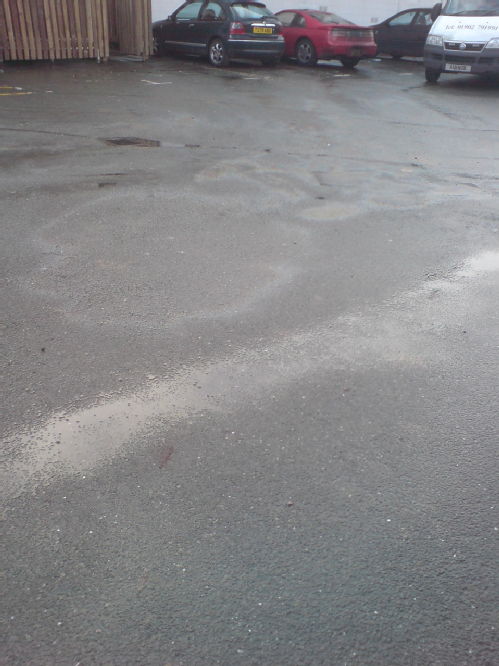
Whenever it rains, the roads in this area are awash with diesel. Last year a slick covered half of the width of the road, running at least from University Road to Kenilworth, following (here’s a clue) the bus route.
As our motorcycling friend recently discovered, diesel on wet tarmac reduces grip dramatically. The criminal negligence of commercial vehicle operators (and it is illegal) injures and kills many riders.
Here’s another photo:

This is not a rare occurrence, it is constant. A few things that various responsible authorities need to be aware of:
- spilling diesel onto the highway is a road traffic offence;
- vehicles that spill diesel due to a fault are illegal;
- owners of roads open to the public on which diesel spills occur are liable for injuries that happen as a result of spills not being cleared;
- local councils or the Highways Agency must clear spills on roads for which they are responsible.
As the slogan says:
KILL THE SPILLS!
August 08, 2006
A seizure, a bypass, and a very fast bike
How many goats must be sacrificed before beginning the starting procedure? In these modern politically correct times we no longer sacrifice virgins. Goats yes: messy but legal. Virgins no: messy, illegal, very much so. Such bloodlettings are only one of many requirements:
- check the petrol taps are on;
- estimate the exact degree of choke using a complex algorithm combining the ambient air temperature with the quantity of oil in the sump and the latent heat in the pistons (or just guess and get it wrong);
- put the bike on its centre stand;
- pray to the correct pantheon of Germanic gods;
- sacrifice goats (not virgins);
- sign Satanic pact (in blood) henceforth dedicating one's soul to the Antichrist;
- mount BMW motorcycle;
- place heal of boot onto the kick starter;
- gently pump the kick starter up and down for anything up to half an hour;
- be amazed when sufficient compression is generated in the 1000cc lump so that firing commences;
- rev the engine at exactly the right time in exactly the correct manner so as to keep the cylinders firing;
- don't ever stop reving the engine until it is thoroughly warmed up (ten miles of riding is usually sufficient).
Starting a 13 year old BMW R100 GS Paris Daker desert racer without an electric starter motor is a fairly futile task. But occassionaly, thanks to BMW reliability, the task is unavoidably necessary. A single click from the ignition system had made the situation quite clear. The starter had seized. This might have been a side effect of a high speed 200 mile non–stop blast between Kenilworth and Dorchester the day before. But I suspect that the bike just realised that it was only 10 miles from its spiritual home (the dealer from whence it came). It is often uncanny in this manner.
And so, only a few minutes after deciding to give in and buy myself one of the wonderful new R1200GS rocket bikes, I was again back on track. Had I been riding a modern bike I would still be waiting for the tow truck. The R100GS was one of the last bikes to be equipped with a kick start, the idea being that electrics do fail quite easily when riding far out in its natural environment, the Sahara.
My arrival at CW's caused a minor stir. The GS–PD is a rare sight. Wally, top technical man, had come in specially to supervise work on what seems to be one of his favourites. In the past he has replaced the gearbox, shaft drive, brakes, one exhaust valve, and various other bits under warranty. Now being out of warranty (over ten years old), I would have to pay for a new starter motor myself: £175. I would also have to wait for a few days – not part of my agenda. Wally is also recommending that he fit a bypass to cut out the oil cooler, which is now rather old and a potential problem. Common wisdom claims that the cooler isn't really required, unless riding in the desert, and in fact the engine runs better without it. I have given him a Touratech bypas kit to apply.
Having amazed everyone with my kick–start miracle, I sat down for a while to chat with Wally and Neil. Wally has a theory about kick starting: it is a genetically inherited skill, or rather, some kind of primeval drive. Some people have it, other don't. He also claims that it guarantees success with the ladies! I'm not sure about that. But it certainly did get me tio CW's, from whom I departed a couple of hours later riding a loan bike. A very fast loan bike: a new R1150R naked roadster on which I could bimble around Dorset, ride back to Kenilworth, and then return in a few days to collect the GS PD. Excellent service as usual.

BMW R1150R – a sexy black naked roadster. Fast, manouverable, moderately comfortable (legs a bit too cramped). I even managed to get the front wheel to slide in a corner. The telelever front suspension is often blamed for this habit – it makes the bike much more stable, but also isolates the rider from the traction, making it hard to know when it is losing grip.
 Robert O'Toole
Robert O'Toole

 Please wait - comments are loading
Please wait - comments are loading